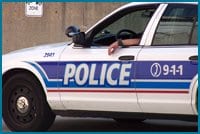The Ontario cities of London and Peterborough are following Ottawa and Edmonton’s lead by attempting to forge closer ties with police through a queer liaison committee.
Ottawa’s liaison committee, the first of its kind, was formed nearly 20 years ago after seeming police indifference to the murder of a young man who was perceived to be gay.
“By bringing together this [queer] sector with the police, we can build on the good relationship we have with the GLBT community,” says Const Pete Testa of the London Police Service. The London liaison committee is in a very early stage, he says.
“All I’ve done is talk to some citizens of London and to my sergeant,” says Testa, a London police diversity officer. “I’ve talked to some citizens of London who were very supportive and might even want to be on the committee.”
Testa said his sergeant was equally supportive, but actual committee meetings will take some time. “From what I understand, Peterborough took a year,” he says. “You have to create terms of reference, values, a goal. We’re looking at August to September 2009.”
In Peterborough, meetings have been going on for several months. Officer Leslie Harries-Jones and Sgt John Lyons, the police representatives for that committee, could not be reached for comment at press time.
James Bromilow, community co-chair of the Ottawa liaison committee, said Ottawa committee members recently spoke to the Peterborough group.
“We talked about the importance of maintaining open, respectful and informed dialogue,” says Bromilow. Forming a liaison committee, he says, requires a lot of patience.
Bromilow says the Peterborough liaison committee is built directly on the lines of the Ottawa committee. Members elect a community chair and vice-chair, and the police chief appoints a police representative, with seats reserved for representatives of other departments within the police and law enforcement. Every queer organization in the community is entitled to send a representative.
Bromilow says Ottawa and Peterborough face some of the same challenges. “There are some parallels about what their community is going through, the same things Ottawa has faced, same things the GLBT community has faced on a daily basis, things that are not necessarily crimes, like throwing garbage at you at Pride or calling you fag on the street,” he says. “And there is a lack of understanding by the police.”
Bromilow says the Ottawa committee has also contacted the London group. “We have spoken to [Testa] and if there is any help he needs, we will offer our support.”
He hopes the liaison committees in the smaller cities will do what Ottawa’s liaison committee has done for its queer population.
“The dynamic between the police and [Ottawa’s queer] community is much less antagonistic than it was in the past,” he says. “There is a greater emphasis on partnership, and the GLBT community is considered not as foreign… more like a segment of the general population,” says Bromilow.


 Why you can trust Xtra
Why you can trust Xtra


